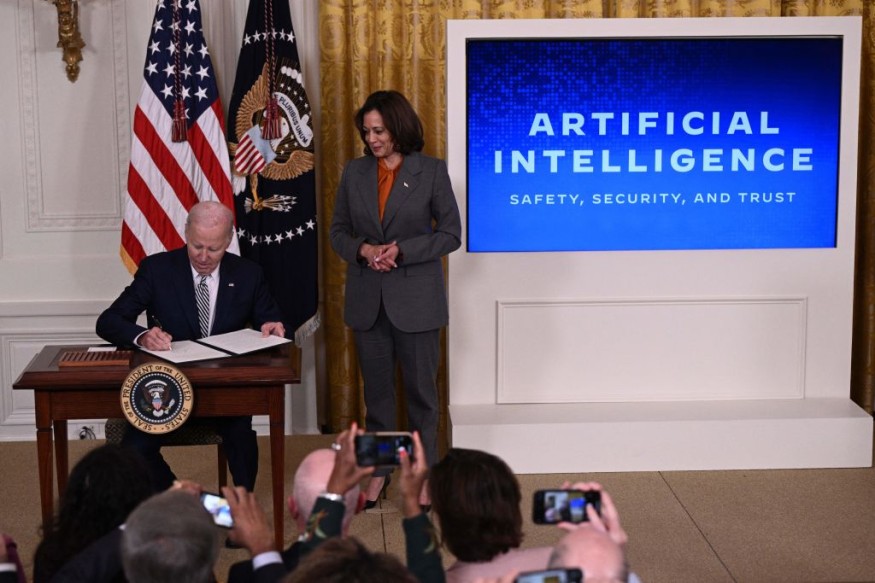Joe Biden Explains Why He Signed Executive Order To Regulate Artificial Intelligence

President Joe Biden signed an executive order on artificial intelligence that has garnered mixed reviews from experts in the rapidly evolving AI technology sector, FOX News reports.
The EO includes provisions intended to enhance oversight and regulations for AI, and it has elicited both support and concerns from various stakeholders.
One significant focus of the Biden AI executive order is the provision for "testing data," allowing the federal government to review AI algorithms.
This provision is seen as a step toward addressing potential bias in AI systems.
In the wrong hands, AI can make it easier for hackers to exploit vulnerabilities in the software that makes our society run.
— Joe Biden (@JoeBiden) October 31, 2023
That’s why I’m directing the Department of Defense and the Department of Homeland Security to develop game-changing cyber protections that will make our…
Christopher Alexander, Chief Analytics Officer of Pioneer Development Group, explained that since core algorithms are proprietary, providing oversight and commercial protections through data sharing could be essential.
However, he emphasized the importance of ensuring this effort remains bipartisan and technocratic, devoid of political ideology, to effectively address the challenges posed by AI.
President Biden characterized the executive order as the "most sweeping actions ever taken to protect Americans from the potential risks of AI systems."
The order mandates AI developers to share safety test results with the government, establish standards to monitor AI safety, and implement privacy protections to safeguard individuals as AI technology advances rapidly.
Biden highlighted the omnipresence of AI and the need to govern this technology to both harness its potential and mitigate potential risks.
Joe Biden Executive Order
The order utilizes the Defense Production Act to compel leading AI developers to share safety test results with the government, per AP.
The National Institute of Standards and Technology is tasked with creating standards to ensure the safety and security of AI tools before they are publicly released.
The Commerce Department will issue guidance to label and watermark AI-generated content to distinguish it from authentic interactions.
The EO addresses a broad spectrum of issues, including privacy, civil rights, consumer protections, scientific research, and worker rights.
The White House's Chief of Staff, Jeff Zients, emphasized the need for urgency in addressing AI-related challenges, acknowledging that the government must move as fast, if not faster, than the technology itself.
AI has the potential to accelerate progress in various fields, such as cancer research, climate change modeling, economic growth, and government services.
However, it also presents challenges, including the distortion of truth, exacerbation of inequalities, and providing tools for scammers and criminals.
While the European Union is on the verge of finalizing comprehensive AI regulation, and Congress is in the early stages of debating AI safeguards, the Biden administration is acting by issuing guidance and standards to shape private sector behavior and lead by example in the federal government's use of AI.
Why Experts Think Joe Biden Artificial Intelligence EO Is Not Enough?
The Joe Biden Executive Order on artificial intelligence is just one of several actions related to AI that his administration has taken VOX noted.
Before the order, there were initiatives such as the White House's Blueprint for an AI Bill of Rights and securing voluntary safety commitments from tech companies involved in AI.
While this EO is being seen as a significant step, it is not the only action planned. The legislative branch, particularly the Senate and House of Representatives, also has a role to play in developing AI-related legislation.
Senate Majority Leader Chuck Schumer has been actively involved in AI legislation efforts, and the Senate Judiciary subcommittee on privacy, technology, and the law has proposed a bipartisan framework.
Rep Don Beyer, vice-chair of the House's AI Caucus, emphasized the need for Congress to legislate strong standards for equity, bias, risk management, and consumer protection.
While the Biden administration has touted its efforts in AI safety, other countries, notably the European Union, have also taken steps to regulate AI, with the EU's AI Act being a prominent example.
Additionally, China and the G7 countries are working on their own frameworks and agreements for AI regulation, and Vice President Kamala Harris is participating in an international summit on AI regulation.
READ MORE: Kamala Harris Assures Joe Biden's Reelection
This article is owned by Latin Post.
Written by: Bert Hoover
WATCH: Biden signs wide-ranging executive order on AI standards and regulations - From ABC News
Subscribe to Latin Post!
Sign up for our free newsletter for the Latest coverage!

















